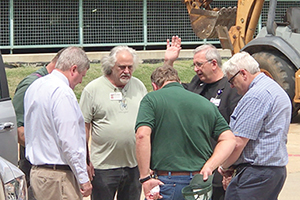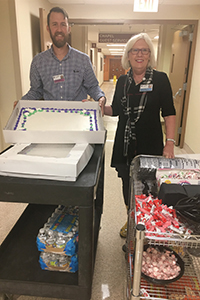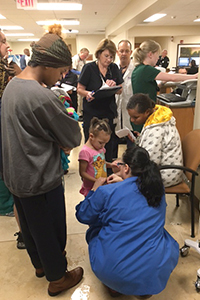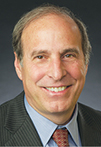By JULIE MINDA
The five spiritual care team members who staffed the "ride-out" team at CHI St. Luke's Health — Baylor St. Luke' s Medical Center during Hurricane Harvey likely never imagined their role would include operating a dish line at the medical center.
But, there they were on an afternoon in late August in the immediate aftermath of the hurricane, cleaning off used patient trays, discarding trash and sending dishes through the industrial dishwasher at the Houston hospital.
"The cafeteria's serving staff had it really tough — they were a small group working long hours during the hurricane," explained Theodore M. Smith, director of mission integration for Baylor St. Luke's. The kitchen staff, he said, "had been just about at the breaking point from fatigue, and one team member teared up when (the spiritual care team) showed up to give them a break."

Deacon David Fowler, right rear, a member of the spiritual care team at CHRISTUS St. Michael Health System, blesses a group from plant operations departing to reinforce their counterparts at CHRISTUS St. Elizabeth Hospital in Beaumont, Texas. The crew worked to restore and maintain facilities at the hospital. Hurricane Harvey caused widespread flooding and knocked out Beaumont’s water supply. St. Michael is in Texarkana, Texas.
Natural and man-made crises — including hurricanes, tornadoes, earthquakes and mass casualty events — can strike virtually any community, and it's usual for hospitals in affected communities to be key responders. For Catholic facilities, it's essential to attend not only to medical needs during a community crisis but also to spiritual, emotional and practical needs. That is according to spiritual care leaders at ministry sites that responded to Hurricane Harvey along the Texas coast or to Hurricane Irma, which hit Florida in September.
Tracie Loftis, chief mission integration officer for Ascension's Jacksonville, Fla., market, said, "We know that spiritual care is a clinical intervention, and our chaplains are part of that clinically integrated team of providers; it was really important to us to ensure that we continued our focus on providing that personalized care for the whole person — body, mind and spirit — both to our caregivers and to those we cared for during the hurricane." Ascension has three hospitals and a network of other facilities in Jacksonville that provided medical and spiritual care as part of their Hurricane Irma response.
Logistical preparations
At ministry facilities, spiritual care teams were closely involved in preparations in the days leading up to the hurricanes, said Smith, Loftis and two other ministry leaders who spoke to Catholic Health World: Nancy Cook and Fr. Clement Oyafemi. Cook is spiritual care director of CHRISTUS Southeast Texas Health System; and Fr. Oyafemi is director of pastoral care for the five Trinity Health hospitals in Tampa, Fla., that also are part of Florida's BayCare system.
Cook, Loftis, Fr. Oyafemi and Smith said their spiritual care teams were represented on facility-wide incident command teams. And, their spiritual care team leaders spent the lead-up to the storms refining their staffing plans and formal and informal communications plans and making sure spiritual care providers had a good grasp on their role in the weather crises response. Spiritual care providers were part of house-wide lead-up, ride-out and recovery teams alongside clinical care providers.
Being there
Cook, Loftis, Fr. Oyafemi and Smith said their spiritual care teams — which included chaplains, residents and interns of various faith traditions — maintained an around-the-clock presence at the hospitals during the hurricanes.
All their hospitals stayed open throughout the storms, but since those facilities had discharged most medically cleared patients in anticipation of the hurricanes' approach, many of the hospitals' patient counts were down. This enabled the spiritual care team members to increase their focus on staff needs. All the hospitals had large storm ride-out medical teams who lived on-campus throughout the storm, often working long hours while perhaps worrying about how their own loved ones and homes were faring in the storm.

Counselor Mathew Sciba and Spiritual Care Director Nancy Cook of CHRISTUS St. Elizabeth Hospital in Beaumont, Texas, delivered goodies to colleagues during Hurricane Harvey and its aftermath. Beaumont endured record rainfall and widespread flooding.
Cook, Loftis, Fr. Oyafemi and Smith said their chaplains rounded on all units multiple times each day throughout the storm, comforting and praying with patients and staff, and sometimes trying to lighten the apprehension and strain with humor, treats or games and other novelties.
"We were an interested, listening presence — that was the main thing we did," said Smith of Baylor St. Luke's. "We helped people destress and debrief," said CHRISTUS' Cook. "We were truly just being with them, in whatever space they were in," said Ascension's Loftis.
Trinity Health hospitals' Fr. Oyafemi recalled the evening when Hurricane Irma was bearing down on Tampa. Many staff on a particular unit were extremely anxious about the storm's imminent arrival, and they asked the spiritual care team to visit their unit. Fr. Oyafemi and chaplain coordinator Sheryl Joy Nicholson led a prayer circle for the unit at 1 a.m. — the time the storm was closest to Tampa — using a prayer adapted for the occasion by the priest, as well as scripture on Jesus calming a storm and the song "He's Got the Whole World in His Hands."
Nicholson wrote in a recollection of the event, "At the end of the service there was tranquility. It was as if Jesus himself appeared and breathed peace into the emotional storm.
"The staff expressed immense gratitude for the comfort, hope and support they received," she wrote. (Tampa had been expected to bear the brunt of Hurricane Irma, but was spared the worst of the storm.)
Hierarchy of needs
In Texas, Hurricane Harvey brought the heaviest tropical downpour in U.S. history and caused severe flooding along the state's coast. CHRISTUS' six-hospital Corpus Christi region and its two-hospital Southeast Texas region were hardest hit by the storm, and the Southeast Texas hospitals were impacted by flooding around them. Cook, who helped coordinate and lead the spiritual care response for CHRISTUS Southeast Texas, noted that during the throes of the storm and flooding, staff needed to feel physically and emotionally safe and grounded to perform at their highest levels. So, beyond the traditional chaplain activities, such as praying with and comforting people in the hospital, the spiritual care providers on the storm ride-out teams also focused on material needs and staff well-being.

CHRISTUS St. Elizabeth clinicians worked long hours in stressful situations during the hurricane, and spiritual care team members rounded frequently to help provide comfort and care to staff and patients. Here a respiratory therapist examines a child who was transported by helicopter to the emergency room because flooding had made roads impassable.
CHRISTUS Southeast Texas' hospitals provided toiletries and brought treats to staff members, including three giant sheet cakes salvaged from retirement celebrations canceled because of the storm. That CHRISTUS region also hosted "Hurricane Harvey Lounges" for off-duty staff. The lounges were stocked with games and beverages; some employees unwound by playing guitar.
Houston's Baylor St. Luke's spiritual care team wheeled around a tea cart with refreshments for staff.
The real work
While mitigating staff and patient anxiety on-site in the worst of the weather was a consuming task for spiritual care teams, "immediately after, the real work comes in," said Cook. Hurricanes Harvey and Irma caused widespread flooding. "A lot of associates lost everything," she said.
Cook, Loftis, Fr. Oyafemi and Smith said their spiritual care teams spent the immediate aftermath of the storms helping employees access emergency and long-term storm recovery aid. This included the teams pointing staff in need to recovery funds, individual and group counseling and other assistance.
Spiritual care teams have continued rounding on floors, offering comfort to employees and watching for and responding to signs of distress and poor coping. Smith of Baylor St. Luke's said colleagues appreciate the check-in. "When people go through something traumatic, there's a basic inherent need to tell their story," and spiritual care team members have been there to listen, he said.
Cook said CHRISTUS Southeast Texas will keep its hurricane lounges open through the end of the year to give employees a casual place to gather together and process their storm experiences.
Cook added that while the hurricanes may be out of the headlines for now, "There are signs of real grief" over losses sustained in the storms. CHRISTUS estimates more than 700 staff requested aid, about 430 of them in the Southeast Texas region.
The long process of recovery and rebuilding is stressful. "People are realizing, 'I have to pay my mortgage for my underwater house, plus I have to pay rent on my new place'" while rebuilding, Cook said.
Cook, Loftis, Fr. Oyafemi and Smith said their facilities will continue supporting staff during this recovery. Cook said, "It will take years" for people to recover.
|
Hochman: Ministry leaders can help provide grounding in times of crisis

Hochman
Last month, the worst mass casualty shooting in U.S. history left 58 dead and over 500 injured in Las Vegas; multiple deadly wildfires in California scorched or incinerated over 120,000 acres, making this one of the worst fire seasons in the state's history.
Renton, Wash.-based Providence St. Joseph Health has a data center in Las Vegas and hospitals and outpatient facilities in the wildfire zones. Employees of those Providence St. Joseph facilities have been in the throes of the disasters either as caregivers, or as community members sharing in the trauma.
Dr. Rod Hochman, president and chief executive of Providence St. Joseph, spoke to Catholic Health World about how and why, as a leader of a Catholic health system, he made it a priority to send messages of shared humanity, encouragement and empathy to employees and other community members affected by the disasters. Hochman chairs CHA's board of trustees.
"There is a lot of chaos in the world these days, and it's very unsettling," Hochman wrote in an email interview with Catholic Health World. "It's important for leaders to acknowledge what's happening in the world around us and recognize that we share a collective shock and sadness.
"Many of our caregivers have told me they appreciate knowing they work for an organization that cares," Hochman said. "It provides a sense of hope."
He blogs at rodhochmanmd.org, and he turned to this outlet several times in October. After hurricanes caused heavy damage in Texas, Florida and Puerto Rico, and following the massacre at a concert on the Las Vegas strip, he posted about the "profound sense of sadness and a collective angst that comes from seeing one community after another devastated by natural disaster and acts of violence. It is in these moments that we must be there for one another. Through love and compassion, we can all contribute to the hope and healing of this world."
Hochman said he intends for these messages to provide a sense of "groundedness" in uncertain times. In his blog posts — and in many of the system's social media posts — there is a recognition of the fraught feelings and deep emotions unleashed by disasters; expressions of gratitude to frontline responders; messages of sympathy for, and solidarity with, victims; and information on how to aid those affected.
"In the case of the California wildfires," he said in his interview in mid-October, "those are happening right in our backyard, and our caregivers are serving as first responders. They have been a pillar in the affected communities and have kept our operations open to serve patients in need even while many of them have lost their homes or have been evacuated."
Providence St. Joseph said that 152 caregivers, physicians and volunteers lost their homes in the wildfires. Many other staff had other damage.
The system has been providing assistance with temporary accommodations, funds for basic necessities and financial aid to those staff. Three of the system's foundations are collecting disaster relief funds. About 500 staff have received cash assistance.
Hochman said it's important for disaster-related communications to be informative and timely. The system purposefully avoids any language that could be construed as self-promotional during times of crisis, he said.
|
|
Spiritual care team members must practice self-care in crises, say experts
Spiritual care team leaders who spoke to Catholic Health World about responding effectively in natural and manmade disasters agreed that response plans must allow team members time and resources to care for themselves throughout a crisis, so they have the emotional and physical stamina to do their jobs under extreme stress.
They advise spiritual team leaders to:
- Ground the spiritual care team in prayer, including by starting each team meeting throughout the crisis with prayer.
- Ensure fresh staff relieve those who staffed the disaster as soon as it is safe to do so.
- Stay in close communication with team members throughout the event to assess stress and exhaustion levels, and to shift staffing to provide needed relief.
- Ensure all team members have adequate opportunity to rest before, during and after the crisis.
- Allow for some fun and levity, joining colleagues for games, social visits and refreshments.
- Debrief as a team after the event to explore how the experience impacted team members.
- Encourage team members to reflect on the impact of the experience, and seek spiritual guidance for unresolved issues.
— JULIE MINDA
|
|
Some ministry facilities include spiritual care in written preparedness plans
Some Catholic health facilities are intentional about ensuring spiritual care is top of mind in crises, by including spiritual care leaders and staff in formal emergency response planning.
Tracie Loftis is chief mission integration officer for Ascension's Jacksonville, Fla., market. She said since spiritual care is such an integral part of "who we are," as a Catholic health ministry, it is incorporated into every aspect of operations, including emergency planning. All Ascension markets, including Jacksonville, she said, put spiritual care in their disaster response plans, which are updated annually.
Like other essential units in the hospital, the spiritual care department is expected to plan ahead to fully staff lead-up, ride-out and recovery teams during weather events; and all staff are to ensure their contact information is up to date and that there are backup plans for communicating during the emergency. These and other expectations are formally documented in the system's written contingency plans.
Spiritual care also is incorporated into formal disaster plans for CHI St. Luke's Health - Baylor St. Luke's Medical Center, said Theodore M. Smith, director of mission integration.
At CHRISTUS Southeast Texas Health System, spiritual care department leaders had just begun discussions about drawing up written disaster response plans and protocols for their department — and they had just begun perusing a book on the subject — when Hurricane Harvey hit. Related flooding deeply impacted the market's two hospitals.
Nancy Cook, the market's spiritual care director, said while there was not yet a formal, written plan in place for the region's spiritual care team, the department spent the days during the hurricane's approach confirming their staffing and communication plans and taking part in twice-daily planning meetings. The team also was represented on the region's incident command center.
|
Copyright © 2017 by the Catholic Health Association
of the United States
For reprint permission, contact Betty Crosby or call (314) 253-3490.